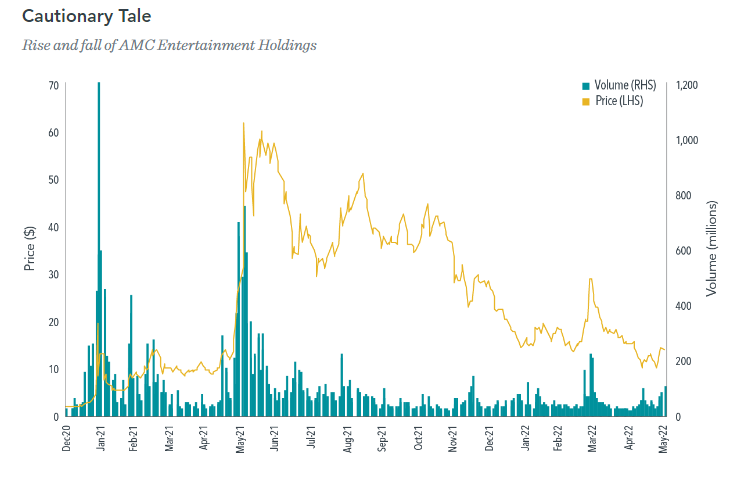During the pandemic, many people’s hobbies included baking banana bread, binge watching Tiger King, and...
Day trading certain meme stocks.
With commission-free trading platforms widely available, and an abundance of time (and for some, money) to spare...
Retail investors downloaded trading apps and opened accounts in droves.
I've no doubt some of these new investors jumped into the market for entertainment purposes and potential riches.
But many simply wanted to experience the supposed thrill of short-term trading.
This “get rich quick” hysteria can be tempting and sometimes, impossible to tune out of.
But while the less exciting journey that diversification offers may be less entertaining, it generally makes for a better experience than leaving investment goals to chance.
Case study from Dimensional
Part of the meme frenzy of sending certain stocks “to the moon” relies on what members of the meme-stock community call “diamond hands".
This refers to investors holding onto a stock, despite the pressure of heavy losses, because they believe the stock price will rise again.
On the flip side, “paper hands ” is an insult hurled at investors who are perceived as weak because they exited a stock position too early.
Take the infamous meme stock AMC Entertainment Holdings Inc.
Here we have an example of how investors’ experiences with the same security can be dramatically different.
This story unfolded in many ways, but based on trading volumes and volatility as catalysts for the actions of hypothetical investors, Dimensional compared the journeys of a hypothetical “Paper Hands” investor versus a “Diamond Hands” one.
Both bought AMC on January 27, 2021, when the stock hit a record trading volume of 1.2 million shares and closed at $19.90 per share.
Happy days.
Paper Hands then sold a few months later, on the second-highest trading-volume day, at the all-time-high closing price of $62.55.
Paper Hands happened to be one of the “get rich quick” success stories with an investment that tripled in a few short months.
Diamond Hands, believing AMC was still en route to the moon, held on, but after a bumpy year finally let go and sold—down 19%.
Meanwhile, over the same period, the Russell 3000 Index (a capitalisation-weighted stock market index that seeks to be a benchmark of the entire U.S stock market) rose 18% and with far less volatility.

Of course, this hypothetical case study uses the benefit of hindsight.
But it clearly shows how, even if someone boards the right meme-stock rocket ship relatively early, riches are not guaranteed.
The hypothetical investor must also decide when exit, which is easier said than done.
To have the chance of quick riches on a single stock, you must pick the right one before it goes up.
A needle in a haystack.
Of the roughly 3,000 names in the Russell 3000 Index, less than 2% (46 names) rose 200% or more over the course of any two-week period from March 2020 through May 2022.
Some of these names were well-known meme stocks such as AMC, Eastman Kodak Company, GameStop, and Workhorse Group Inc., each of which is down substantially from its high.

Suppose an investor was lucky and bought one of these 46 names two weeks before it notched the 200%-plus gain.
Even so, stock picking is a risky move.
Approximately 30% of those stocks ended up underperforming the overall market (as represented by the Russell 3000 Index) through May 2022.
Investors who bought in after the 200%-plus gain likely fared worse.
Only about a quarter of stocks that rocketed 200% or more went on to subsequently outperform the market through May 2022.
This result isn’t surprising.
Research shows that relatively few individual stocks outperform the market.
Holding a diversified portfolio with many of the world's best companies decreases the chances of a permanent loss and increases the chances of owning the big winners that drive market performance.
Even within our retrospective sample of stocks with very high short-term returns, market outperformance isn’t guaranteed.
And, of course, without the benefit of hindsight, the odds are heavily stacked against the meme-stock investor.
Chasing individual names in hopes of catching a meme-stock phenomenon may be tempting, but the data is clear that it’s a big gamble.
As Matt Hall says in his book:
"Instead of wasting your time and money, buy the whole haystack."
Investors would be better off investing for the long term in diversified portfolios and spending time and effort on other hobbies picked up in the pandemic.
For those that want a better way to invest, keep these three principles in mind:
- Diversification has been called the only free lunch in investing
- Uncertainty is part of investing
- Investments should be aligned with goals
As David Booth of DFA said,
If your portfolio is broken after dipping your toes into meme stocks, I'd be delighted to take a look and set up back on the right, long-term path.“Making money slowly is much better than making—then losing— money quickly.”

